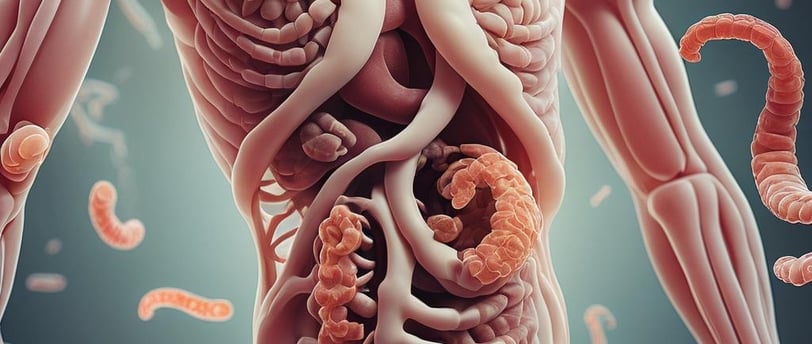CABINET INDIVIDUAL DE PSIHOLOGIE PAP ELENA
servicii psihologice de calitate
The Role of the Gut Microbiome in Autism Development: Discoveries and Perspectives
The Role of the Gut Microbiome in Autism Development: Discoveries and Perspectives
4/7/20243 min read


It has been scientifically proven that there is a connection between the gut microbiome and autism.
Recent studies have shown that the gut microbiome plays a crucial role in the development and functioning of the immune system and the central nervous system. This is because the intestines are populated by trillions of bacteria, fungi, and viruses that form the gut microbiome. This microbiome is essential for digestion, nutrient absorption, and the production of vitamins and enzymes.
A decrease in bacterial diversity and a change in the composition of the microbiome have been observed in children with autism. These imbalances can affect the functioning of the immune system and contribute to chronic inflammation in the body. Additionally, certain bacterial species have been found to be more prevalent in the microbiome of children with autism, while others are less present.
Another important aspect is the link between the gut microbiome and the brain. It has been discovered that the intestines and the brain communicate constantly through the gut-brain axis. This communication occurs through chemical substances produced by intestinal bacteria, which can reach the brain and influence its functioning.
In light of these findings, researchers are trying to understand how changes in the gut microbiome can affect the development and functioning of the brain in children with autism. Studies have shown that certain substances produced by intestinal bacteria can have neurological effects and can influence behavior and cognitive functioning.
Although these findings are promising, it is important to note that research in this field is still in its early stages. More studies are needed to fully understand the mechanisms through which the gut microbiome can influence the development and manifestations of autism.
Additional Study: [New Research Clarifies Connection Between Autism and the Microbiome](https://www.sfari.org/2023/06/26/new-research-clarifies-connection-between-autism-and-the-microbiome/)
Perspectives
Studies by certain researchers have paved the way for the development of microbiome-based interventions for children with autism. These interventions may include dietary modifications, supplementation with probiotics or prebiotics, and other strategies aimed at optimizing the composition of the gut microbiome in hopes of improving autism symptoms.
Probiotic and Prebiotic Supplementation
One relevant study in this field is the study titled "Impact of Probiotic Administration on the Microbiome and Behavioral Symptoms in Children with Autism Spectrum Disorder (ASD)". This study was conducted by a group of researchers and published in the journal "Nutrients" in 2019.
The main aim of this study was to evaluate how probiotic administration influences the composition of the gut microbiome and behavioral symptoms in children with autism spectrum disorder.
The study involved a sample of children aged 3 to 9 years diagnosed with ASD, who were divided into two groups: one group that received probiotics and a control group that received a placebo. The duration of the study was six weeks.
The results of the study showed that probiotic administration led to a significant change in the composition of the gut microbiome in children with ASD. Specifically, there was an increase in microbiome diversity and a change in the relative proportion of certain bacterial species.
Regarding behavioral symptoms, significant improvements were observed in the group that received probiotics compared to the control group that received placebo. These improvements included a reduction in anxiety symptoms, repetitive behaviors, and other symptoms associated with ASD.
The study concluded that probiotic administration can have a beneficial effect on the composition of the gut microbiome and can contribute to improving behavioral symptoms in children with autism spectrum disorder. However, further studies are needed to confirm and extend these findings and to determine the precise mechanisms through which probiotics influence the microbiome and behavioral symptoms in children with ASD.
Link to Study: [Impact of Probiotic Administration on the Microbiome and Behavioral Symptoms in Children with Autism Spectrum Disorder](https://www.ncbi.nlm.nih.gov/pmc/articles/PMC6723895/)
Fecal Microbiota Transfer
A relevant study in this context is "Long-term Benefit of Microbiota Transfer Therapy on Autism Symptoms and Gut Microbiota", published in the journal Scientific Reports in 2020.
This study investigated the long-term effects of microbiota transfer therapy (Fecal Microbiota Transfer - FMT) on autism symptoms and gut microbiota in children with autism spectrum disorder (ASD).
The research method involved recruiting a group of children with ASD and gastrointestinal symptoms who underwent fecal microbiota transfer therapy. Autism symptoms and gut microbiome composition were evaluated before and after treatment, and these evaluations were repeated at 8 and 18 months post-treatment.
The results of the study showed that fecal microbiota transfer therapy led to significant improvements in autism symptoms during the long-term follow-up period. Additionally, significant changes were observed in the composition of the gut microbiome, with an increase in microbiome diversity and a change in the relative proportion of certain bacterial species.
Furthermore, these improvements were maintained in the long term, as observed at 8 and 18 months post-treatment.
The study thus highlighted the long-term benefits of fecal microbiota transfer therapy in improving autism symptoms and modifying gut microbiota in children with ASD and gastrointestinal symptoms.
Link to Study: [Long-term Benefit of Microbiota Transfer Therapy on Autism Symptoms and Gut Microbiota](https://www.nature.com/articles/s41598-020-62235-6)
It is recommended to consult the specific studies mentioned above and other academic sources to obtain detailed information, quotes, and precise statistics regarding research on the gut microbiome and autism.


